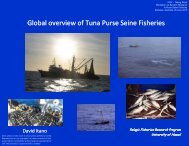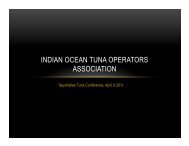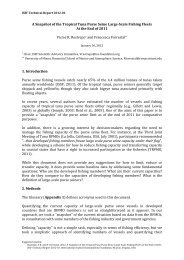PPT for Subway JULY2011.pptx - International Seafood ...
PPT for Subway JULY2011.pptx - International Seafood ...
PPT for Subway JULY2011.pptx - International Seafood ...
You also want an ePaper? Increase the reach of your titles
YUMPU automatically turns print PDFs into web optimized ePapers that Google loves.
Educating Stakeholders About Our <br />
Approach to Tuna Sustainability <br />
Prepared <strong>for</strong> <strong>Subway</strong> <br />
Presented by Susan S. Jackson, President, ISSF
Tuna in the Spotlight <br />
Tuna is one of the most high-‐profile seafoods, often <br />
the target of media & activist campaigns <br />
Market-‐changing activist campaign in UK triggered <br />
retailers to drastically change sourcing policy <br />
UK press paid attention – coverage was higher than <br />
usual thanks to week-‐long TV documentary on subject <br />
Activist campaign has been replicated in North <br />
America & New Zealand
About ISSF <br />
The <strong>International</strong> <strong>Seafood</strong> Sustainability Foundation <br />
(ISSF) is a global coalition of leading scientists, <br />
the tuna industry and WWF, the world’s leading <br />
conservation organization, <br />
committed to science-‐based initiatives <strong>for</strong> the long-term<br />
conservation and sustainable use of tuna <br />
stocks, reducing bycatch and <br />
promoting ecosystem health.
Participating Companies <br />
Bolton Alimentari <br />
Bumble Bee Foods, LLC / Clover Leaf <strong>Seafood</strong>s <br />
CMC <br />
Conservas Garavilla, S.A. <br />
FRINSA <br />
Jealsa Rianxeira S. A. <br />
MW Brands <br />
Negocios Industriales Real NIRSA S.A. <br />
Princes Ltd. <br />
R.S. Cannery Co., Ltd <br />
Salica Industria Alimentaria, S.A. <br />
Sea Value Co., Ltd. <br />
StarKist Co. <br />
Thai Union Manufacturing Co. Ltd / Chicken of the Sea Intl. <br />
TriMarine <strong>International</strong>
Board of Directors <br />
Chair <br />
Christopher <br />
Lischewski, <br />
Bumble Bee Foods <br />
Vice Chair <br />
Dr. William Fox, <br />
WWF-‐U.S. <br />
President <br />
Susan Jackson <br />
Chair, Scientific Advisory <br />
Committee <br />
Dr. Victor Restrepo <br />
John Connelly, <br />
National Fisheries <br />
Institute <br />
Alfred Schumm, <br />
WWF-‐Germany <br />
Miguel Jorge, <br />
National <br />
Geographic Society
Scientific Advisory Committee <br />
Chairman Dr. Victor Restrepo – Former Assistant Dr. John Hampton – Program Leader, Ocean <br />
Executive Secretary, <strong>International</strong> <br />
Fisheries Programme <br />
Commission <strong>for</strong> the Conservation of Atlantic <br />
Tunas (ICCAT) <br />
Vice Chair Dr. Meryl Williams – Founding <br />
Coordinator, FishWatch-‐AsiaPacific Project of <br />
Asian Fisheries Society; Honorary Life <br />
Member, Asian Fisheries Society <br />
Dr. Laurent Dagorn -‐-‐ Senior Scientist, Institut de <br />
Recherche pour le Development <br />
Dr. Dale Squires – Senior Scientist & Economist, <br />
National Marine Fisheries Service, NOAA, U.S. <br />
Dept. of Commerce <br />
Dr. Robin Allen – Former director, IATTC, current <br />
Executive Secretary, Interim Secretariat / <br />
<strong>International</strong> Consultations on proposed <br />
South Pacific Regional Fisheries Management <br />
Organization <br />
Dr. Richard B. Deriso – Chief Scientist, Inter-‐<br />
American Tropical Tuna Commission <br />
Dr. Gerald Scott – Senior Advisor, NOAA-‐<br />
Fisheries Southeast Science Center <br />
Dr. Iago Mosqueira – Researcher, Center <strong>for</strong> <br />
Environment, Fisheries & Aquaculture <br />
Science, United Kingdom
Other Committees <br />
Environmental Stakeholder Committee <br />
Vessel Committee <br />
Bycatch Project Steering Committee
Managing Tuna Fisheries
Average World Catches of Tuna <br />
2004-‐08 <br />
By Species <br />
By Ocean
Regional Fisheries Management <br />
Organizations -‐ RFMOs <br />
IATTC <br />
ICCAT <br />
IOTC<br />
WCPFC <br />
Tuna stocks are managed by 4 regional <br />
fishery management organizations (RFMOs).
Status of the Stocks
Environmental Impact <br />
Environmental <br />
impact is measured<br />
<br />
<br />
by fishing gear. All <br />
rankings are general <br />
and may vary by <br />
region or specific <br />
stock. <br />
PS -‐ Free School <br />
Troll <br />
PS – FADs & logs <br />
Pole and line <br />
Longline <br />
Midwater trawl <br />
Gillnet
% of bycatch varies <br />
depending on gear. <br />
Does not include juvenile tunas. <br />
Does not include baitfish or <br />
juvenile non-‐target tunas.
Our Strategic Plan
Approaches <br />
1. Endorse applied science to support decision <br />
making and adoption of best practices <br />
2. Publicly advocate <strong>for</strong> effective and necessary <br />
measures <br />
3. Take direct action to support necessary change <br />
through polices of private companies
Strategic Areas of Focus <br />
1. Control and Reduce <br />
Fishing Capacity <br />
2. Mitigate Bycatch <br />
3. Eliminate IUU Fishing <br />
4. Expand Data Support <br />
5. Advance Per<strong>for</strong>mance <br />
in Monitoring, Control <br />
& Surveillance <br />
6. Improve Overall Tuna <br />
Stock Health
What We’re Working On
#BycatchProject <br />
The Use of FADs <br />
ISSF is working to reduce the environmental impact of <br />
purse seine fishing <strong>for</strong> tuna with FADs. <br />
FADs are a very efficient way to catch tuna, but FADs also <br />
attract small tuna that is not being targeted, as well as <br />
other fish species and some species of sharks. Not all <br />
bycatch is killed; some of it is released alive at sea.
#BycatchProject <br />
• Globally coordinated project <br />
• Identify best practices, new techniques and <br />
enhanced technologies to minimize catch of <br />
non-‐target marine life <br />
• Scientists test ideas on board fishing vessel <br />
• Skippers are educated through participatory <br />
workshops around the world
Skippers Workshops<br />
To date, workshops have been held in North <br />
America, Central and South America, Africa, <br />
Europe and the Pacific Island Region.
IUU Fishing <br />
ISSF Participating Companies have committed <br />
to refrain from transactions with vessels on any <br />
RFMO negative list, which engage in illegal, <br />
unregulated and unreported fishing.
Traceability <br />
Tracing tuna from capture to shelf. Data <br />
includes: <br />
• Name and flag of catcher and transshipping <br />
vessels <br />
• Fish species and weight <br />
• Ocean of capture/RFMO area <br />
• Fishing trip dates and gear used <br />
• Date the company took ownership of the fish
Vessel Registry <br />
• ISSF Participating Companies support only those <br />
vessels that are registered with an RFMO <br />
• ISSF supports and encourages the use of unique <br />
vessel identifiers (UVI) <br />
• Participating Companies refrain from <br />
transactions in tuna with vessels that fail to <br />
secure a UVI
Helping to improve fisheries is a <br />
much more sustainable route than <br />
abandoning those that need work.
In June of 2011, ISSF Launched <br />
MAKEtheCOMMITMENT <br />
A Global Improvement Plan <br />
<strong>for</strong> Better Practices <br />
in Tuna fisheries
We can eliminate half the <br />
discarded bycatch in purse seine <br />
fisheries by 2014 while building the <br />
framework <strong>for</strong> better managed <br />
and monitored fleets.
100% Observer Coverage <br />
Goal: 100% Human or electronic (if effective) <br />
observers on board purse seine vessels. <br />
Project: Develop standards <strong>for</strong> programs and training <br />
material, conduct training and testing. <br />
Deadline: January 2013 <br />
Trained observers ensure that data is recorded<br />
properly and vessels comply with sustainable<br />
practices.
Obtain UVI Number <br />
Goal: All fishing vessels, no matter the size or gear <br />
type, are to obtain a UVI number. <br />
Project: Conduct a study on mechanisms that can be <br />
used to assign UVIs to vessels that are currently too <br />
small to receive IMO numbers. Develop <br />
implementation plan. <br />
Deadline: January 2013 <br />
A UVI requirement <strong>for</strong> all fishing vessels will allow<br />
<strong>for</strong> tracking vessels as they move about the globe<br />
and/or are renamed, which helps with<br />
transparency.
Seiners must be flagged to a relevant <br />
RFMO member <br />
Goal: Purse seine vessels must be flagged to a <br />
relevant RFMO member/cooperating nation and must <br />
maintain substantial compliance with RFMO <br />
obligations. <br />
Project: Contract a compliance review of all RFMO <br />
members and Cooperating Non-‐members. Advocate <br />
<strong>for</strong> increasing transparency. <br />
Deadline: January 2014 <br />
Membership and compliance with RFMO<br />
conservation measures assures purse seiners<br />
are operating in a sustainable manner.
100% participation in VMS, data <br />
available to RFMO <br />
Goal: All vessels will have a Vessel Monitoring <br />
System to provide location data to RFMOs. <br />
Project: Develop VMS protocols and a system <br />
that is reliable and accurate; lead fundraising <br />
to create a body to process data. <br />
A VMS system assists in the traceability and<br />
MCS schemes.
Report Tuna Catch and Bycatch <br />
Following ISSF Protocol <br />
Project: ISSF will work with consultants to <br />
develop a species identification and reporting <br />
protocol that will be delivered via workshops <br />
and training to fleet owners and skippers.
• Skippers trained in bycatch reduction, MCS <br />
and data reporting by January 2013 <br />
• No purse seine transshipments at sea by <br />
January 2012 <br />
• Full retention of bycatch by January 2014 <br />
• Vessels to maintain FAD logbooks
Market <strong>for</strong>ces can not impact <br />
longline fisheries the way <br />
coordinated advocacy and the <br />
leadership of influential <br />
nations will.
Longliner Best Practices <br />
Goal: Longliners institute best practices in sea <br />
bird mitigation and hook technology, and <br />
participate in turtle release education. <br />
Project: Develop training and dissemination <br />
method. Conduct workshops on bycatch <br />
handling and develop a mandatory, ongoing <br />
annual training and refresher program.
A sustainable pole & line fishery <br />
must have a management plan in <br />
place to protect important stocks <br />
of baitfish. This is essential, not <br />
optional.
Management Plans <strong>for</strong> Baitfish <br />
Project: Document existing baitfish <br />
management plans and determine the key <br />
components to be included in baitfish <br />
management plans, including monitoring and <br />
assessment requirements. <br />
The baitfish used <strong>for</strong> pole & line are a significant<br />
part of regional marine ecosystems and are<br />
important to local subsistence fisheries
How <strong>Subway</strong> Can Support <br />
Improvements in Tuna Fisheries
Philippines <br />
Member of the Indian <br />
Ocean Tuna Commission <br />
(IOTC) <br />
Member of the Western <br />
and Central Pacific <br />
Fisheries Commission <br />
(WCPFC) <br />
Uncertain data from significant <br />
fleets of industrial purse <br />
seiners from […] longliners <br />
from[…]Philippines […] <br />
“To date, Philippines has not <br />
implemented a logbook system <br />
on its longline vessels, the <br />
catch-‐and-‐ef<strong>for</strong>t data reported <br />
to the Secretariat being highly <br />
aggregated and incomplete.”
Indonesia <br />
Member of Indian Ocean <br />
Tuna Commission (IOTC) <br />
Cooperating Non <br />
Member of Western and <br />
Central Pacific Fisheries <br />
Commission <br />
“Lack of statistics from <br />
industrial longliners of <br />
Indonesia and Malaysia <br />
not based in their <br />
territories.” <br />
“Lack of catch-‐and-‐ef<strong>for</strong>t <br />
data <strong>for</strong> longliners from <br />
Indonesia”
Encourage suppliers to support vessels <br />
meeting the best-‐in-‐class standards <br />
Get to know the supply chain in order to <br />
better understand the status of specific stocks <br />
and the impact of fishing on the oceans <br />
ISSF maintains a library of resource & science papers,<br />
available <strong>for</strong> download at ISS-Foundation.org







